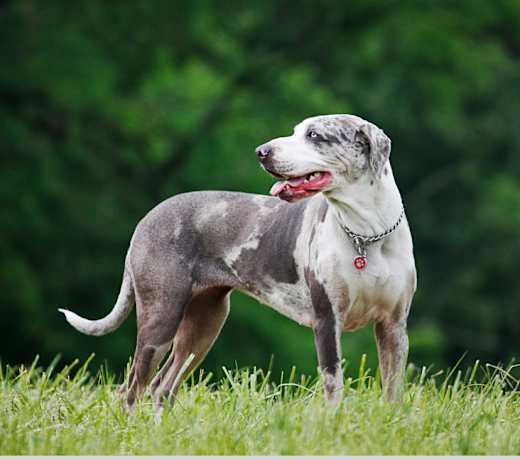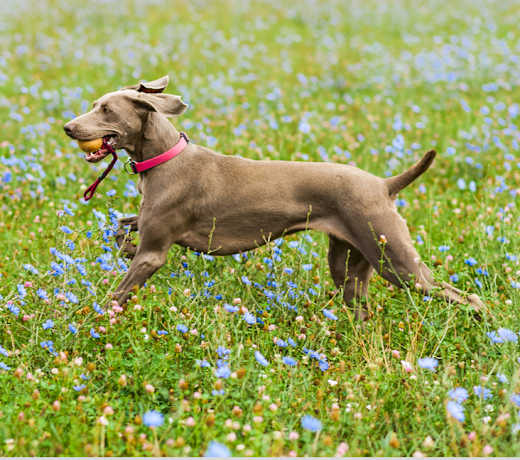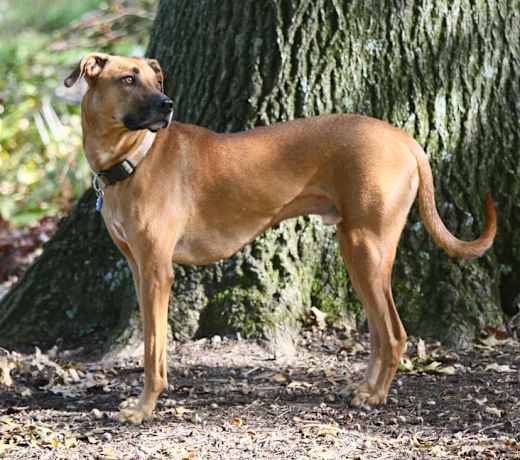No, Rhodesian Ridgebacks typically don’t have an undercoat. Their coat is short and sleek, with a layer of longer guard hairs. This coat composition helps them regulate their body temperature in warm climates without becoming excessively insulated. While they may have some minimal undercoat, it’s not as pronounced or thick as breeds adapted to colder environments.
Rhodesian Ridgeback
Breed Type: Hound
Common nicknames: Ridgies, African Lion Dog
Coat: Smooth
Hypoallergenic: No, they will likely trigger allergies.
Temperament: Energetic, loyal, independent, intelligent
Life expectancy: 10-12 years
Color & patterns: Red wheaten
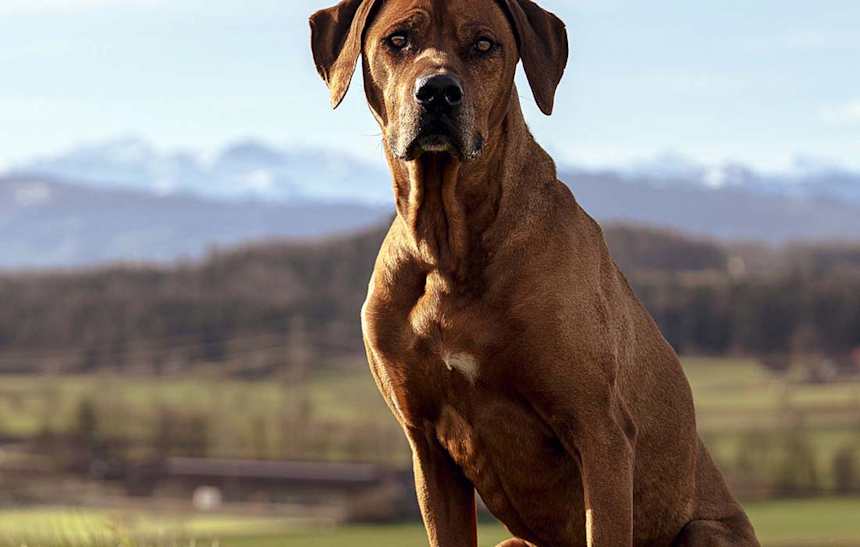
Known for their remarkable athleticism and courage, Rhodesian Ridgebacks are the perfect adventure buddies. Whether hiking up mountains, jogging around the block, or playing fetch in the yard, these pups are always up for some action-packed fun. Rhodesian Ridgebacks are courageous and confident, making them excellent watchdogs and guardians, but this breed also knows how to kick back and relax, and their gentle and affectionate nature towards their loved ones makes them wonderful companions and family pets. With the Rhodesian Ridgeback, you’ll get a devoted, noble friend who will bring security, love, and unforgettable moments to your life.
Rhodesian Ridgeback characteristics
Learn about about Rhodesian Ridgeback basics like their fur colors, shedding levels, how much grooming they need, and other Rhodesian Ridgeback facts.
Average height
24-26 inches (61.0-66.0cm)
Average weight
59-97 pounds (26.8-44.0 kg)
Average lifespan
10-12 years
Exercise needs
Grooming needs
Full-grown size
Good with cats
Good with kids
Training Aptitude
Do Rhodesian Ridgebacks shed?
Yes, Rhodesian Ridgebacks shed, but they are minimal shedders. Grooming a Rhodesian Ridgeback is pretty straightforward: an occasional brushing will do right by this breed.
What color are Rhodesian Ridgebacks?
Rhodesian Ridgebacks can be a number of colors, including wheaten, light wheaten, and red wheaten, with black or brown noses.
How big do Rhodesian Ridgebacks get?
Rhodesian Ridgebacks are large dogs, most weighing 70 to 85 pounds and standing around 24 to 27 inches tall. Males Rhodesian Ridgebacks are generally larger than females.
What age does a Rhodesian Ridgeback stop growing?
Rhodesian Ridgebacks usually stop growing in height around 12 to 18 months old, but their bodies continue to develop in terms of muscle mass and overall maturity until they reach around two to three years old.
How long do Rhodesian Ridgebacks live?
Rhodesian Ridgebacks typically live between 10 to 12 years. However, individual lifespans can vary based on factors such as genetics, diet, exercise, healthcare, and overall lifestyle. Providing proper care, regular veterinary check-ups, a balanced diet, and maintaining a healthy weight can contribute to helping dogs of all breeds live long and healthy lives.
Rhodesian Ridgeback temperament
Learn about about the Rhodesian Ridgeback temperament and how well they fit into your lifestyle, home environment, and family.
Are Rhodesian Ridgebacks affectionate?
Yes, Rhodesian Ridgebacks tend to have affectionate bonds with their families. They often form strong attachments to their human companions and enjoy spending time with them. They may show affection in various ways, such as leaning against you, cuddling, or giving gentle nudges. However, their affectionate nature can also include being protective and watchful over their loved ones.
Are Rhodesian Ridgebacks aggressive?
No, Rhodesian Ridgebacks are not inherently aggressive. Properly raised and socialized Ridgebacks are typically confident, loyal, and protective of their families. They are known for their strong prey drive and protective instincts, which can manifest as aggression towards unfamiliar animals or perceived threats to their territory. Early socialization and consistent training are crucial to helping them develop into well-adjusted and friendly companions.
If you are concerned by any signs of aggression or reactivity in your dog, be sure to address it promptly with the help of a professional trainer or behaviorist. Pain, discomfort, or underlying medical conditions can sometimes contribute to changes in a dog’s behavior, so it may also be worth visiting a vet to rule out their health as a cause for their behavior.
Do Rhodesian Ridgebacks bark a lot?
No, Rhodesian Ridgebacks don’t bark a lot. They will usually only bark if they’re very bored or if they sense real and true danger (visitors to the door don’t count). As with any dog, they can be discouraged from barking with proper training and exercise.
Are Rhodesian Ridgebacks good with cats?
Rhodesian Ridgebacks have a strong prey drive, so whether or not they get along well with cats is going to depend on the dog and their training. However, this is an adaptable breed, and you can feel fairly confident that if properly socialized to your cat and/or introduced at a young age, your Rhodesian Ridgeback should get along with a cat well.
Are Rhodesian Ridgebacks good with other dogs?
Yes, Rhodesian Ridgebacks can get along well with other dogs. Early socialization and positive experiences with other dogs can help them develop good manners and friendly interactions. However, because of their hunting background and strong prey drive, they may not always tolerate smaller animals or pets, such as cats, unless they’ve been raised together from a young age.
Are Rhodesian Ridgebacks smart?
Yes, Rhodesian Ridgebacks are known to be smart and independent thinkers. With consistent training and mental stimulation, they can learn quickly and excel in various activities such as obedience, agility, and tracking. However, they may also have a bit of a mischievous streak, so keeping them mentally engaged and providing outlets for their energy is important to prevent boredom and undesirable behaviors.
Can Rhodesian Ridgebacks live in apartments?
Yes, while Rhodesian Ridgebacks are relatively large dogs, and access to outdoor spaces for exercise and playtime is beneficial, they can adapt to apartment living if their exercise needs are met. They require regular physical activity and mental stimulation to stay happy and healthy.
Are Rhodesian Ridgebacks good guard dogs?
Yes, Rhodesian Ridgebacks can make good guard dogs due to their protective instincts, alertness, and intimidating presence. They are known to be loyal and courageous, willing to defend their families if they perceive a threat. However, proper training and socialization are essential to ensure they distinguish between friend and foe and respond appropriately to different situations.
Do Rhodesian Ridgebacks like water?
Rhodesian Ridgebacks’ affinity for water can vary from individual to individual. Early exposure and positive experiences with water can influence their preferences. It’s essential to introduce any dog to water gradually and provide encouragement and rewards to help them feel comfortable if you want to encourage a love for water activities.
Are Rhodesian Ridgebacks good for first-time pet parents?
Yes, Rhodesian Ridgebacks can be suitable for first-time pet parents under the right circumstances. They are intelligent and trainable dogs, but they also have a strong will and independent streak, which may require patience and consistency in training. Potential pet parents should be prepared to invest time and effort into their training and socialization from an early age. Additionally, they need regular exercise and mental stimulation to prevent boredom and undesirable behaviors.
Are Rhodesian Ridgebacks easy to train?
Yes, Rhodesian Ridgebacks take to training well if they have a confident, able trainer who knows how to correct their willfulness. Rhodesian Ridgebacks need consistent training to be a properly socialized family dog, and it's worth noting that training any dog takes substantial time and effort, regardless of breed.
Are Rhodesian Ridgebacks good with kids?
Yes, Rhodesian Ridgebacks can be good with kids, but, like all dogs, pet parents need to train them to behave gently with children and vice-versa. Rhodesian Ridgebacks are large, exuberant dogs who can be a bit too rambunctious for small children, though they make wonderful, albeit protective playmates to active, older kids.
As with any breed, it is recommended that parents always supervise children when interacting with a dog to keep both the child and dog safe.
Are Rhodesian Ridgebacks good family dogs?
Yes, Rhodesian Ridgebacks are good family dogs. They are loyal, dedicated family members who have a ton of energy and will need daily mental and physical stimulation. This breed is best for an active family that seeks an independent and strong-willed yet devoted companion.
Rhodesian Ridgeback history
Learn about where the Rhodesian Ridgeback came from.
What were Rhodesian Ridgebacks bred for?
Rhodesian Ridgebacks were originally bred in Africa to track lions. Dogs with the same spinal ridge as Rhodesian Ridgebacks have been used for centuries as hunters and companions of the Khoikhoi tribe of southern Africa.
Why do Rhodesian Ridgebacks have a ridge?
The distinctive ridge on their back is a result of a genetic trait. It’s a strip of hair that grows in the opposite direction to the rest of their coat. This characteristic comes from a unique feature in their DNA. Historically, this ridge served a practical purpose for the breed, helping them withstand the hot African climate by providing some protection from the sun. Beyond its functional aspect, the ridge has become a defining feature of the breed, distinguishing them from other dogs.
Where are Rhodesian Ridgebacks from?
Rhodesian Ridgebacks are originally from southern Africa — specifically Rhodesia, a country that is now known as Zimbabwe. The breed as we know it today descends from Cornelius van Rooyen, who kept a pack of lion-hunting dogs in the country.
Rhodesian Ridgeback health
Learn about about the Rhodesian Ridgeback health outlook and what diseases they may be prone to at various stages of their life.
Are Rhodesian Ridgebacks healthy?
Rhodesian Ridgebacks are generally a very healthy, sturdy breed, though the breed is one of the most affected by thyroid disorders.
Hip and/or elbow dysplasia: Hip and elbow dysplasia are two of the most common skeletal diseases seen in dogs. They are similar diseases in which either the hip or elbow joint has grown abnormally or is misshapen. The abnormal shape prevents the joints and sockets from adequately meeting one another, resulting in rubbing and grinding instead of sliding smoothly. Though the main complication with hip dysplasia is joint instability, the abnormalities present in elbow dysplasia often result in pieces of bone and/or cartilage breaking loose and irritating the joint tissues. Over time, the rubbing from dysplasia can cause a variety of issues, such as pain, lameness, and secondary osteoarthritis. Surgery can be done to fix the joint if diagnosed before the onset of arthritis.
Eye problems: Rhodesian Ridgebacks may experience cataracts, a common eye condition that causes cloudiness in the eye and obstructs vision, and progressive retinal atrophy (PRA), a progressive degenerative disease affecting the retina that eventually leads to blindness.
Hypothyroidism: Hypothyroidism is a thyroid malfunction that results in low hormone production and could cause obesity, low energy, and a brittle coat.
Neuronal ceroid lipofuscinosis (NCL): This family of inherited degenerative nervous system disorders affects how the body breaks down certain types of fat or proteins within the body’s cells. The body’s inability to break down these proteins eventually causes the cells to stop working properly and leads to a decline in mental and motor functions.
Others: Rhodesian Ridgebacks may also experience gastric dilatation-volvulus, a sudden, painful, and life-threatening swelling and twisting of the abdomen; and degenerative myelopathy, a degenerative genetic disorder that causes progressive paralysis in the hind legs. To identify some of these issues, a veterinarian may recommend hip, eye, and imaging tests for the dog.
Are Rhodesian Ridgebacks hypoallergenic?
No, Rhodesian Ridgebacks are not considered hypoallergenic. They do shed, though their short coat requires less maintenance compared to breeds with longer or denser fur. However, shedding still produces dander, which is a common allergen for people allergic to dogs.
What do Rhodesian Ridgebacks usually die from?
Like all dogs, Rhodesian Ridgebacks are susceptible to various health conditions, and the specific causes of death can vary. Some common health issues in the breed include hip dysplasia, elbow dysplasia, hypothyroidism, dermoid sinus (a congenital skin condition), and certain types of cancer. Responsible breeding practices and regular veterinary care can help minimize the risk of these health concerns, but it’s essential for pet parents to be aware of potential health issues and monitor their Ridgeback’s health throughout their life.
How fast can a Rhodesian Ridgeback run?
Rhodesian Ridgebacks are capable of reaching speeds of up to 30 to 40 miles per hour in short bursts, especially when motivated or during activities such as lure coursing or sprinting. Their athletic build and powerful muscles contribute to their ability to achieve such impressive speeds.
Popular Rhodesian Ridgeback mixes
Breeds that are commonly mixed with Rhodesian Ridgebacks include Boxers, Labrador Retrievers, and Saint Bernards. A few common Rhodesian Ridgeback mixes include:
Rhodesian Boxer (Rhodesian Ridgeback + Boxer)
Rhodesian Labrador (Rhodesian Ridgeback + Labrador Retriever)
Rhodesian Bernard (Rhodesian Ridgeback + Saint Bernard)
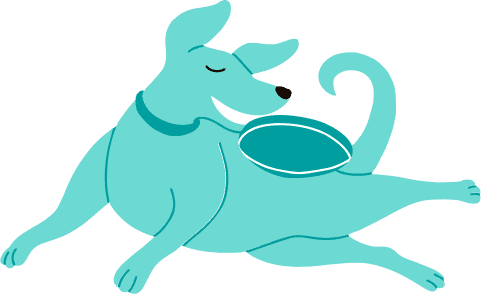
Find Rhodesian Ridgeback puppies near you
Adopting a Rhodesian Ridgeback
Learn about acquiring a Rhodesian Ridgeback - the pros and cons of adopting versus going through a breeder, and associated costs.
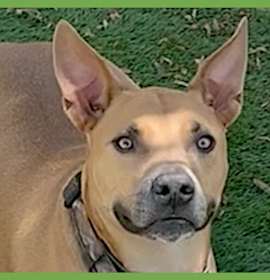
Buddy
Rhodesian Ridgeback Carolina Dog
Male, 2 yrs 6 mos
Los Angeles, CA
Good with dogs
Good with cats
House-trained
Spayed or Neutered
Shots are up-to-date
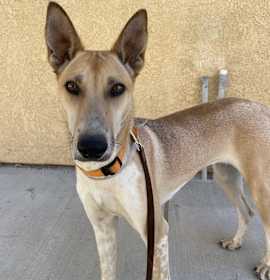
Jolene
Rhodesian Ridgeback Mixed Breed (Large)
Female, 1 yr 1 mo
Encino, CA
Shots are up-to-date
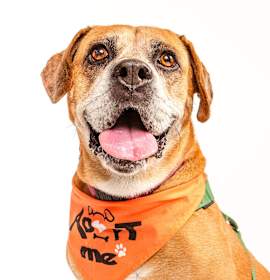
Arya
Rhodesian Ridgeback Boxer
Female, 8 yrs 2 mos
Culver City, CA
Not good with cats
House-trained
Spayed or Neutered
Shots are up-to-date
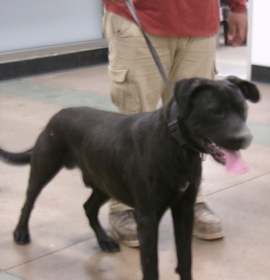
DEAN
Rhodesian Ridgeback Labrador Retriever
Male, 1 yr
Van Nuys, CA
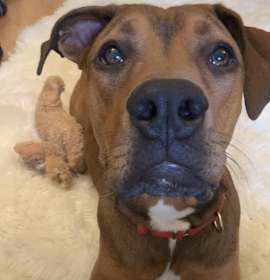
Beautiful Luca
Rhodesian Ridgeback Boxer
Female, young
Los Angeles, CA
House-trained
Spayed or Neutered
Shots are up-to-date
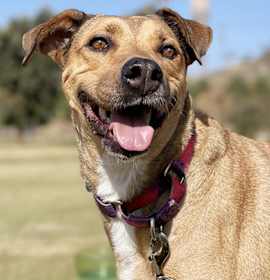
Chumi
Rhodesian Ridgeback German Shepherd Dog
Female, 9 yrs 11 mos
Marina del Rey, CA
Good with dogs
Not good with cats
House-trained
Spayed or Neutered
Shots are up-to-date

BRUNO
Rhodesian Ridgeback
Male, 8 mos
Los Angeles, CA

SIMBA
Rhodesian Ridgeback Black Mouth Cur
Male, adult
Woodland Hills, CA
Good with dogs
House-trained
Spayed or Neutered

Buddy
Rhodesian Ridgeback Carolina Dog
Male, 2 yrs 6 mos
Los Angeles, CA
Good with dogs
Good with cats
House-trained
Spayed or Neutered
Shots are up-to-date

Jolene
Rhodesian Ridgeback Mixed Breed (Large)
Female, 1 yr 1 mo
Encino, CA
Shots are up-to-date

Arya
Rhodesian Ridgeback Boxer
Female, 8 yrs 2 mos
Culver City, CA
Not good with cats
House-trained
Spayed or Neutered
Shots are up-to-date

DEAN
Rhodesian Ridgeback Labrador Retriever
Male, 1 yr
Van Nuys, CA

Beautiful Luca
Rhodesian Ridgeback Boxer
Female, young
Los Angeles, CA
House-trained
Spayed or Neutered
Shots are up-to-date

Chumi
Rhodesian Ridgeback German Shepherd Dog
Female, 9 yrs 11 mos
Marina del Rey, CA
Good with dogs
Not good with cats
House-trained
Spayed or Neutered
Shots are up-to-date

